#anti-Indigenous racism
Text
not to add to the doom posting, but:
the Supreme Court will soon review the constitutionality of the Indian Child Welfare Act.
the ICWA protects Native children from being adopted out of their communities, and it’s under fire bc a white couple is suing on the basis that it’s “racial discrimination” that they can’t adopt a child away from her family, (Brackeen v. Haaland). it’s probably not going to end well.
I encourage you to do your own research, but the point of this post: the Lakota People’s Law Project is assembling a brief, and coordinating with other legal teams on this, including working with the original author of the ICWA.
the Lakota People’s Law Project have a petition you can sign here, and let’s be real, what they really need is donations, (especially since they’re going up against a campaign funded by oil conglomerates).
i’ll put source links in the replies so i can keep them up-to-date.
#anti-indigenous racism#no idea if this post is gonna get traction but i figured i'd try.#seems important yknow#also i highly encourage you to hop on the lakota law email lists#they do a whole lot of work#especially around pipeline protests but also stuff like this
23K notes
·
View notes
Text
Hey, can we talk about the violence against queer natives for a second?
Nex Benedict was a 16 year old nonbinary student who was brutally murdered by three of their female classmates. Not only that, they were a Native American living on a Cherokee reservation, though not enrolled in the tribe, and their actual heritage is that of Choctaw.
Their death was not properly reported on until the blog post that genderkoolaid shared was made. Their nonbinary identity had remained unacknowledged, and it took even longer for their native one to be.
They were a victim of the rising anti-trans rhetoric spreading throughout places like the US. They were beaten in a bathroom after Oklahoma had banned trans people from restrooms, designating them to only use that of their assigned sex. Nex was attacked in the girls bathroom.
A native, two-sprit, nonbinary teenager. Whose identity and the actual circumstances behind the incident, a hate crime, wasn't even published beforehand. They died tragically, a death that could've been easily prevented.
Do you know how scary that is? I'm just like them. A native, two-spirit, nonbinary teenager. I have to keep on hearing stories of people my age, who live in the same country, who share my identity, getting murdered. Not even just murdered, but erased.
I know for an absolute fact that if I died tragically, who I am will not be remembered. My deadname will be on everything. I would not be counted in trans statistics, nonetheless statistics on transmascs. My identity would not be respected. My native heritage wouldn't matter. I didn't get to be enrolled. And Nex had supportive family and friends, people who stood up for them. Not all trans kids get to have that.
I've had to think about this before many times. From the other trans youth deaths I've seen. From nearly becoming one of them. When is it enough? Why do the people in power do nothing to stop kids like me from being killed? Why do they only want to make our lives worse?
I'm very lucky to live in a state that has not wavered on it's protections on LGBTQ+ residents. Though I am reminded often that that can easily change, if things keep going like this.
I could've easily been them. I can still easily be them. There are many other kids who can be them. Everyone should be doing more to protect trans youth, and protect queer natives. We're so often forgotten about. I'm part of small tribes, and tribes who barely even exist anymore. My elders desperately trying to keep it alive. Please do not erase us. I'm queer, I'm native. Nex Benedict should have been protected, youth like me should be protected. I wish the best for their family and I hope their memory is never forgotten.
#nex benedict#protect trans kids#trans rights are human rights#transgender#nonbinary#two spirit#native american#indigenous#tw hate crime#tw murder#transphobia#exorsexism#racism#anti-indigenous racism
212 notes
·
View notes
Text
i love mlp. with my whole heart and soul. but god. it could be fucking racist. like. really really racist. does anyone remember the buffalos? does anyone remember the episode where they were like. the buffalos need to compromise with the settler ponies <3 they’re both equally in the wrong <3 the settler ponies need the land to live <3 this episode was like in 2011 but still. they brought them back
#yeen rambles#mlp#i could write so many essays on all the different racisms in mlp. but i’ll leave that to better qualified people#racism#anti-indigenous racism
130 notes
·
View notes
Text
I talked about doing it for literally 6 years, but I've finally finished Orsinium, here are some quick thoughts:
The Good:
I really enjoyed the Orc politics, and the varying factions you get to deal with. I did see the big twist at the end coming, but that didn't make it less enjoyable.
The creature design rocks. I really love the Echateres, and how they're integral to Orc society. The pocket mammoths are also cute!
The division between Trinimac worshippers and Malacath worshippers was interesting, and portrayed varying factions dedicated to each god.
The armor design was really neat. ESO is super hit and miss with their armor, but I thought the Vosh Rakh armor and the Trinimac armor were neat.
The Bad:
This DLC was really really bad about anti-indigenous racism. For those not aware, ESO as a base game presents the Reachmen to be indigenous to the Reach and surrounding areas as descendants of the Nedes and the proto-Bretons. They have a clan system, utilize nature magic, wear furs, are essentially intended to be read as the stereotypical idea of Native American societies. The Reachmen are near unanimously presented as "basically enemies to everyone (and like it that way)" as described by a developer, and rarely vary in appearance from clan to clan instead of being distinctive cultural identities, furthering the racist idea that actual Native American societies are monolithic entities. I cannot speak for the Daggerfall Covenant quests, but in this DLC the motivation behind the Winterborn (The Reachman clan in question) seems to be to get their land back, which showcases settler anxiety about movements to regain land.
Additionally, there is frequent appropriation of indigenous cultures, without understanding their meaning whatsoever. The ogres who are described as 'savages' live in what appear to be tipis and are treated as unintelligent enemies. There is also this:
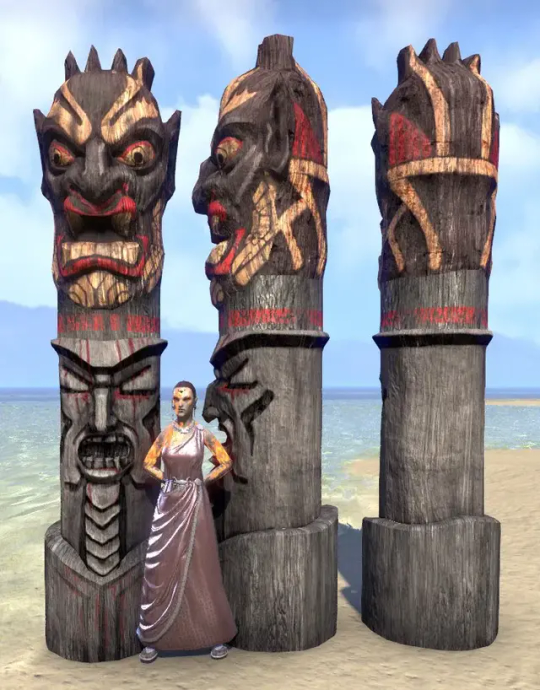
Which wildly appropriates the totem poles used by the people of the Pacific Northwest.
All in all I think ESO needs to apologize for it's offensive actions and remove these objects from the game. I think ESO players also need to be aware of these aspects of the game, and understand what colonizer ideologies lie behind it.
#anti-indigenous racism#The DLC was fine besides the racism. Which you can unfortunately say of many ESO DLCs
76 notes
·
View notes
Text
"Osman Ilgun was arrested in September 2021 and soon transferred to a detention centre 1,500 kilometres away from his home in the Inuit community of Quaqtaq in Quebec's Nunavik region.
At the jail in Amos, Que., he was fed raw food — he says he believes guards stereotypically assumed Inuit people eat raw meat. He said he was forced to quarantine for 28 days, adding he had limited access to showers and phone calls with family during that time.
"My mother, she was so worried because I didn't have access to the phone to tell her what's going on," said Ilgun, who was charged with sexual assault. He has pleaded not guilty and is awaiting trial.
Ilgun was one of the 617 Inuit people admitted to a Quebec jail in the 12 months ending March 31, 2022. That number represents 4.5 per cent of the 13,613 Inuit living in the province — a rate 15 times higher than the average incarceration rate in Quebec, provincial data shows. It's also a rate almost twice as high as that of any other Indigenous group in the province."
Full article
Tagging: @politicsofcanada
#cdnpoli#canadian politics#canada#canadian news#canadian#québec#quebec#Inuit#Indigenous#incarceration#racism#anti-Indigenous racism
166 notes
·
View notes
Text
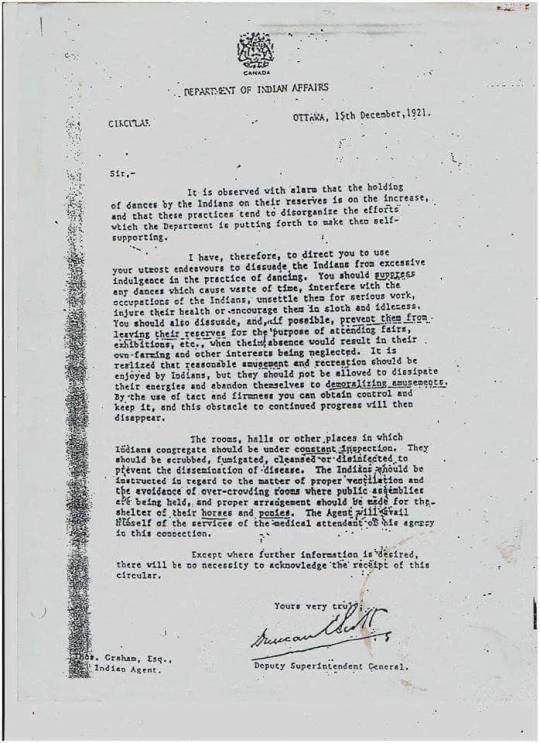
CANADA
DEPARTMENT OF INDIAN AFFAIRS
CIRCULAR
OTTAWA, 15th December, 1921.
It is observed with alarm that the holding of dances by the Indians on their reserves is on the increase, and that these practices tend to disorganize the efforts which the Department is putting forth to make then self-supporting.
I have, therefore, to direct you to use your utmost endeavours to dissuade the Indians from excessive indulgence in the practice of dancing. You should suppress any dances which cause waste of time, interfere with the occupations of the Indians, unsettle then for serious work, injure their health or encourage them in sloth and idleness. You should also dissuade, and, if possible, prevent them from leaving their reserves for the 'purpose of attending fairs, exhibitions, etc., when the absence would result in their own farming and other interests being neglected. It is realized that reasonable amusement and recreation should be enjoyed by Indians, but they should not be allowed to dissipate their energies and abandon themselves to demoralizing amusements. By the use of tact and firmness you can obtain control and keep it, and this obstacle to continued progress vill then disappear.
The rooms, halls or other places in which Indians congregate should be under constant inspection. They should be scrubbed, fumigated, cleansed or disinfected to prevent the dissemination of disease. The Indians should be instructed in regard to the matter of proper ventilation and the avoidance of over-crowding rooms where public assemblies are being held, and proper arrangement should be made for the shelter of their horses and ponies. The Agent shall avail themselves of the services of the medical attendant of his agency in this connection.
Except where further information is desired, there will be no necessity to acknowledge the receipt of this circular.
Yours very truly,
Duncan Campbell Scott
Deputy Superintendent General
Thos. Graham, Esq..
Indian Agent.
[Perhaps one of the bluntest example of the attempt to extirpate Indigenous cultural practices, and frankly, their existence as communities, by the Canadian Department of Indian Affairs.]
#primary document#department of indian affairs#settler colonialism in canada#settler colonialism#violence of settler colonialism#banning cultural practices#racism in canada#anti-indigenous racism#indigenous people#first nations#indigenous history#canadian history#duncan campbell scott
59 notes
·
View notes
Text
"Manitoba First Nations leaders are calling for the resignation of Winnipeg police chief Danny Smyth.
The Assembly of Manitoba Chiefs (AMC), alongside Long Plain First Nation Chief Kyra Wilson, called for Smyth to step down Thursday, due to the police service’s refusal to search the Prairie Green Landfill for remains of three victims of an alleged serial killer.
Smyth has said that the remains are likely in the landfill north of the city, but that no search is planned, due in part to the amount of time that has passed and the fact that there’s no known starting point for a search.
The manager of the site has also said a search would be difficult at the private landfill, due to the constant movement at the site, but said the company is cooperating fully with police and expressed condolences to the victims’ families.
Police said 10,000 truckloads of refuse were dumped in the area since May, when the murders of Morgan Harris, Marcedes Myran, and an unidentified victim, who is being referred to as Buffalo Woman (Mashkode Bizhiki’ikwe), are believed to have taken place. Trash at the landfill is also compacted with heavy mud at a depth of about 12 metres.
In an interview with 680 CJOB’s The Start on Thursday morning, prior to the call for his resignation, Smyth said the ability to search the landfill is outside of police expertise.
“The circumstances at Prairie Green are way different than Brady (Road Landfill),” the police chief said.
“Brady was within our skills. Prairie Green is not — it would be closer to a very hazardous archaeological dig, and that’s not a skill that we have.”
Jeremy Skibicki has been charged with first-degree murder in the deaths. He was previously charged with first-degree murder in the death of Rebecca Contois, whose remains were found earlier this year at the Brady Road landfill.
“Many communities, organizations, and public leaders across the nation, are asking for a thorough search to be conducted at the Prairie Green landfill,” Long Plain First Nation, the home community of both Harris and Myran, said in a statement Thursday.
“The families of the three women deserve to have closure. Morgan Harris, Marcedes Myran and Mashkode Bizhiki’ikwe deserve better. Leadership will continue to advocate to have them found and brought back to their home fires.”
Long Plain’s Wilson will appear with AMC Grand Chief Cathey Merrick at a news conference in Ottawa, where Indigenous leaders and families of the victims have been calling for federal assistance with the situation in recent days, on Thursday."
Article link
To be clear, police chief Danny Smyth is refusing to search for the bodies of three Indigenous women who are victims of a (for legal reasons, alleged) serial killer, despite knowing that they are likely there. If the women in question were white, they would be searching that landfill by now. No question.
Their names are Morgan Harris, Marcedes Myran, and an unidentified woman who is being referred to as Mashkode Bizhiki’ikwe (meaning: buffalo woman).
We should all be outraged.
tagging: @allthecanadianpolitics
#Indigenous#murder#serial killer#racism#anti-Indigenous racism#winnipeg#manitoba#morgan harris#marcedes myran#Mashkode Bizhiki’ikwe#first nations#long plain first nation#danny smyth#murder tw#racism tw#anti-Indigenous racism tw#cops#police#cops tw#police tw#mmiw#mmiwg#missing and murdered indigenous women and girls#missing and murdered indigenous women
156 notes
·
View notes
Text
A common apologia for STAR TREK — particularly TOS, but extending to the newest shows as well — is that it wants or tries to be progressive, but is tripped up by the writers' unconscious biases or the ostensibly more backward social attitudes of its time (whatever time that may be). This argument is somewhat perplexing because STAR TREK has never been what you'd call subtle in expressing its liberal imperialist values, either in 1966–1968 or now.
The core of STAR TREK, which is explained clearly in Roddenberry's pitch and the TOS writer's bible (excerpted at some length in Stephen Whitfield's THE MAKING OF STAR TREK, inter alia), is a hybridization of Horatio Hornblower, the C.S. Forester adventure novels about a heroic British naval officer during the Napoleonic wars, and the American Western, a genre that still dominated a big swath of American TV drama in the period when STAR TREK was conceived. Roddenberry himself had previously written for some of those shows, in particular HAVE GUN, WILL TRAVEL, and his pitch line for STAR TREK was "WAGON TRAIN to the stars."
To its credit, STAR TREK ended up being about more than just that, but Roddenberry was very clear that at heart, the series was about extending the conquest of the American frontier to the stars. Of the Enterprise and the other ships of its class, Roddenberry said:
In addition to the twelve Starships, there are lesser classes of vessels, capable of operating over much more limited distances. They are involved in commercial ventures, survey work, archaeological expeditions, medical research, and so on. The Starships are the heavy cruisers, the ones which can best defend themselves as they probe farther and farther out, opening new areas … and then the others follow. [Whitfield, 204; emphasis added]
Because TOS avoids saying anything very substantive about civilian life and government outside of Starfleet, we actually know very little about factors may be driving this wave of colonialism. If Earth in the TOS-era is a post-scarcity paradise (which, it should be noted, the original show does not ever actually say), why leave home for a riskier, hardscrabble life on worlds like Rigel XII ("Mudd's Women") or Cestus III ("Arena")? Part of it is plainly capitalist interests: There are explicitly opportunities to strike it rich discovering or exploiting valuable resources (or fleecing those who have or hope to, as Harry Mudd does). The Federation is also keen to cement its political hold on worlds that are near the borders of rival empires; the plot of "The Trouble with Tribbles," for example, hinges on the Federation's determination to colonize Sherman's Planet, which is also claimed by the Klingon Empire.
However, these plot details are to some extent beside the point: The premise of STAR TREK, and of most Westerns, is that the importance and heroic necessity of colonizing and "developing" the frontier, bringing (white) civilization to the "savage" wilderness, is self-evident.
Much of STAR TREK is predicated on concepts of "social evolution," the idea that there are a series of consistently defined hierarchical stages from the primitive to the advanced. TOS often states this quite explicitly, but it has remained a key feature of the STAR TREK premise up to the present. This process of advancement is described as both natural and a matter of moral urgency: Kirk rails against the "stagnation" of less-advanced societies, and on multiple occasions argues that the importance of reversing stagnation (or devolution) justifies violating the Prime Directive with dramatic interventionist action to put a civilization back on what he considers the proper track.
The concepts of social evolution STAR TREK espouses are fundamentally racist — it's a philosophy that rationalizes colonial exploitation (and in the real world even slavery) — and play into the franchise's virulent anti-indigenous attitudes. Indeed, STAR TREK frequently takes an openly contemptuous view of "primitive" peoples, who in TOS are often presented as simpletons, either kindly child-men (e.g., "The Apple") or dangerous savages driven by quasi-animal cunning (as with some of the characters in "A Private Little War"). Probably the ugliest example in TOS is "The Paradise Syndrome, where Kirk loses his memory and falls in with a society of American Indians transported centuries earlier to a distant planet; the story emphasizes that, even deprived of the knowledge and technology of his century, Kirk is still the intellectual superior of the people around him (who of course are played by white actors in redface). However, this a recurring theme throughout STAR TREK: Indigenous species are consistently presented as something less than people unless their stage of advancement approximates that of 20th century Earth (as with the Roman proconsul in "Bread and Circuses," who is one of the very few indigenous "primitives" to be credited with any kind of intellectual sophistication). The application of the Prime Directive (which is wildly inconsistent and honored more in the breach than in the observance) is based not on respect for cultural differences, but on a patronizing desire to "protect" indigenous pre-warp civilizations from ideas that their primitive minds can't yet handle.
STAR TREK pays lip service to the idea of cultural and racial diversity, and the Vulcan slogan (in the third season of TOS) "Infinite Diversity in Infinite Combinations." However, what it most consistently espouses is the importance of ensuring the march of social evolution along orthodox lines and the eventual absorption of other races, cultures, and species into the Federation's (white American liberal) ideas of socioeconomic and technological progress. As Kirk says to Ayelborne in "Errand of Mercy":
KIRK: Gentlemen, I must get you to reconsider. We can be of immense help to you. In addition to military aid, we can send you specialists, technicians. We can show you how to feed a thousand people where one was fed before. We can help you build schools, educate the young in the latest technological and scientific skills. Your public facilities are almost nonexistent. We can help you remake your world, end disease, hunger, hardship. All we ask in return is that you let us help you. Now.
"Errand of Mercy" is notable in that Kirk's condescension toward the Organians proves to be ill-founded: What he and Spock assumed was a stagnant, primitive society is actually a kind of backyard bird feeder maintained by a vastly more advanced species that is trying very hard to be patient as Kirk and the Klingons strut around making pronouncements. At the end of the episode, Kirk admits openly that he's embarrassed at how badly he misread the situation. However, this doesn't ultimately lead him to question his presumptions about social progress; he simply admits that in this specific case, they were misapplied.
The result of "Errand of Mercy," as revealed in the second season of TOS, is a peace treaty between the Federation and Klingons that makes the show's endorsement of colonialism and economic imperialism that much clearer: As we're told in "The Trouble with Tribbles," under this new treaty, if there is a territorial dispute over a newly discovered or colonized world, "one side or the other must prove it can develop the planet most efficiently," with the ostensibly benevolent and freedom-loving Federation and the ostensibly "brutal and aggressive" Klingon Empire vying to determine who will be permitted to exploit that world and its resources. The exact role of the Organians in the framing of this treaty is unclear — they have no need of or interest in Federation-style economic development, and nothing in "Errand of Mercy" suggests that they see much value in it, although the Organians do say they find the prospect of a shooting war between the Federation and the Klingon Empire both morally objectionable and "intensely painful" — but its result is to more firmly establish the Cold War conflict between the Federation and Klingons as the competition of two rival colonial powers for control of valuable territory and resources. Their conflict is a primarily economic one, not really substantively based on what Kor calls the "minor ideological differences" between the two empires, which both Kor and the Organians regard as incidental. (Kirk takes issue with that contention, but as previously noted, Kirk has more than once used the explicit threat of planetary genocide to get what he wants, so Kor probably has a point here!)
Later STAR TREK shows are sometimes more self-conscious about these values, but they seldom actually question them, and there's really only so far that STAR TREK can move these load-bearing narrative elements without becoming something really fundamentally different than it is. Moreover, DISCOVERY, STRANGE NEW WORLDS, and PICARD have seemed committed to doubling down on many of the franchise's more disturbing ideological elements, while attempting to paper over viewer unease with appeals to nostalgia, faux-patriotism, and sentimentality.
#teevee#star trek#star trek tos#the making of star trek#gene roddenberry#stephen whitfield#errand of mercy#organians#the paradise syndrome#anti-indigenous racism
14 notes
·
View notes
Text
Attention Creatives
You need to stop with the stories, plot lines, background info, and such in your works that are things like:
The Holocaust and the Atlantic Slave Trade were not really about that it was really a cover for vampires to have a way to access to mass feeding farms found in example like The Strain and Abraham Lincoln: Vampire Hunter
The Spanish Inquisition was really about vampires trying to find witches that could control them story line thanks to True Blood.
World War 2 was because of Greeks gods fighting with each via Percy Jackson.
There are shit-ton more examples of this kind of thing and it is disgusting.
The Holocaust and the Atlantic Slave Trade specifically in regards to United States part of it all and the horrific treatment of enslaved African peoples tend the most commonly used ones, I have found.
That said it does not mean other ethnic cleansing and genocides are not used as well as other major events and tragedies for very specific marginalized and/or minority groups.
These types of stories devalue our on going pain and trauma as well as degrade the memories of both the living and the dead who suffered through those horrors and the many who did not live to see it end.
Our trauma is not a sandbox that you get to play, our history is not something you to play pretend with.
All of us from the various communities that survived these atrocities, these crimes against humanity, these terrors we all each and every one us carry still the scars. Not just scars, but also still healing wounds.
We carry in us the stories of our people, the joys and the sorrows, the hopes and the fears, and we carry the dead so that they may live on in some small way.
You have no right to that, you have no right to pain, to our joy, and most importantly you have no right to recast the reason for it all.
I am so sick of it and it needs to stop.
And this is not even delving into deeper how deeply gross so many of the implications of these storylines are if you think about for just a little bit and the nasty stereotypes they help to reinforce.
#antisemitism#antisemitism in media#antiblackness#antiblackness in media#anti-romani racism#anti-romani racism in media#anti-indigenous racism#anti-indigenous racism in media#racism#racism in media#appropriation of tragedies
19 notes
·
View notes
Text
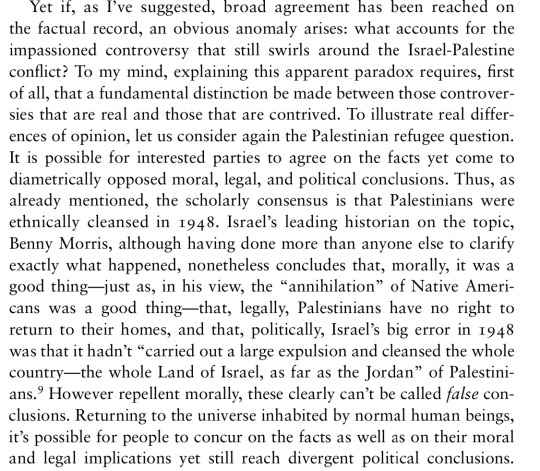
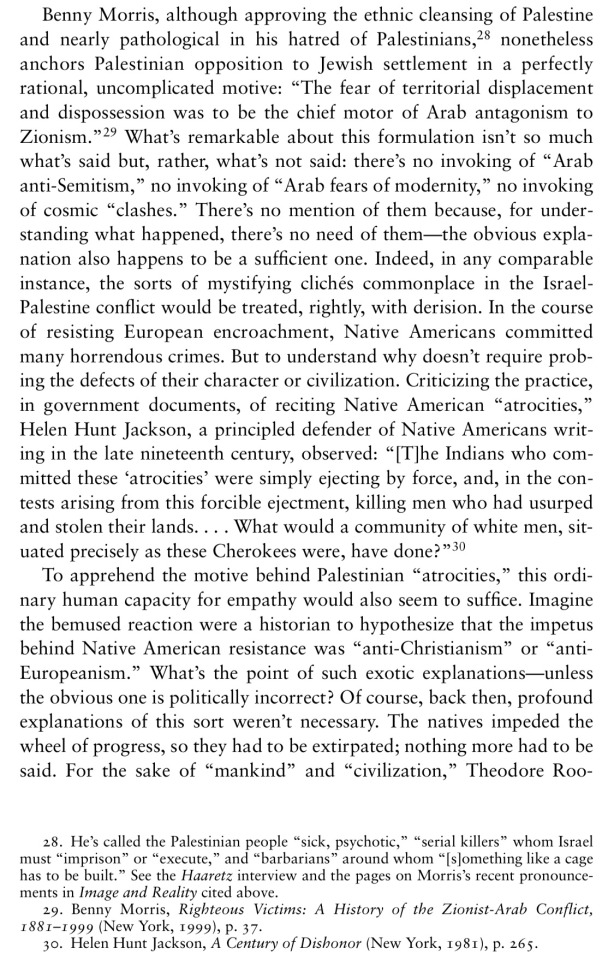
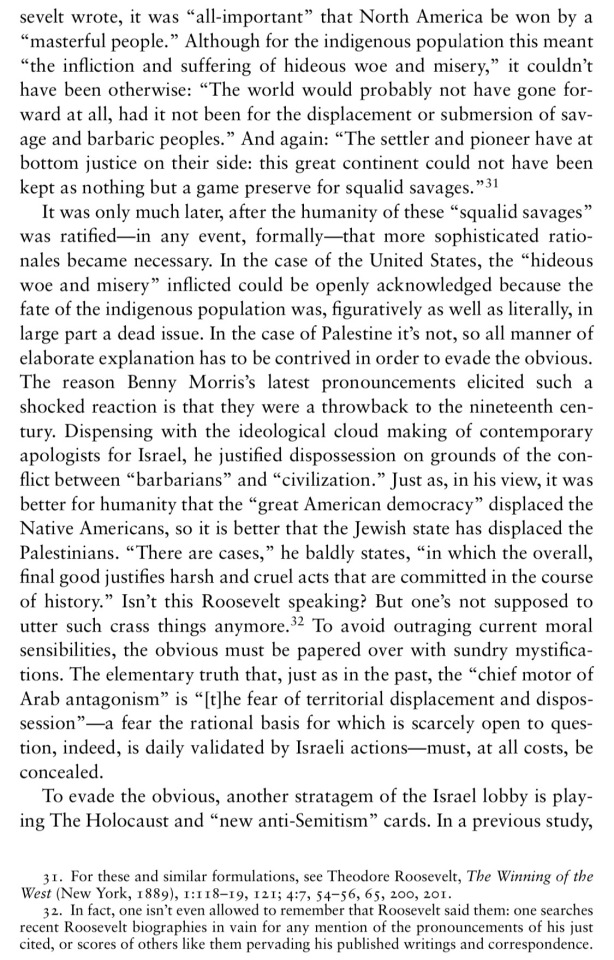
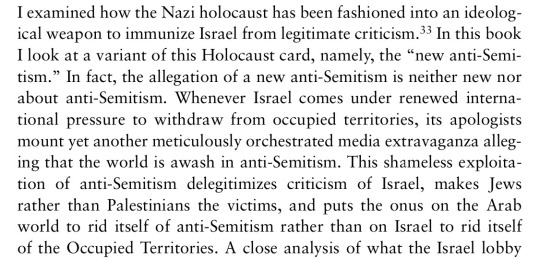
— from Norman G. Finkelstein's Beyond Chutzpah: On the Misuse of Anti-Semitism and the Abuse of History (14-16) (text below)
Yet if, as I’ve suggested, broad agreement has been reached on the factual record, an obvious anomaly arises: what accounts for the impassioned controversy that still swirls around the Israel-Palestine conflict? To my mind, explaining this apparent paradox requires, first of all, that a fundamental distinction be made between those controver- sies that are real and those that are contrived. To illustrate real differences of opinion, let us consider again the Palestinian refugee question. It is possible for interested parties to agree on the facts yet come to diametrically opposed moral, legal, and political conclusions. Thus, as already mentioned, the scholarly consensus is that Palestinians were ethnically cleansed in 1948. Israel’s leading historian on the topic, Benny Morris, although having done more than anyone else to clarify exactly what happened, nonetheless concludes that, morally, it was a good thing—just as, in his view, the “annihilation” of Native Americans was a good thing—that, legally, Palestinians have no right to return to their homes, and that, politically, Israel’s big error in 1948 was that it hadn’t “carried out a large expulsion and cleansed the whole country—the whole Land of Israel, as far as the Jordan” of Palestinians.9 However repellent morally, these clearly can’t be called false conclusions. Returning to the universe inhabited by normal human beings, it’s possible for people to concur on the facts as well as on their moral and legal implications yet still reach divergent political conclusions.
[...] Benny Morris, although approving the ethnic cleansing of Palestine and nearly pathological in his hatred of Palestinians,28 nonetheless anchors Palestinian opposition to Jewish settlement in a perfectly rational, uncomplicated motive: “The fear of territorial displacement and dispossession was to be the chief motor of Arab antagonism to Zionism.”29 What’s remarkable about this formulation isn’t so much what’s said but, rather, what’s not said: there’s no invoking of “Arab anti-Semitism,” no invoking of “Arab fears of modernity,” no invoking of cosmic “clashes.” There’s no mention of them because, for understanding what happened, there’s no need of them—the obvious explanation also happens to be a sufficient one. Indeed, in any comparable instance, the sorts of mystifying clichés commonplace in the Israel-Palestine conflict would be treated, rightly, with derision. In the course of resisting European encroachment, Native Americans committed many horrendous crimes. But to understand why doesn’t require probing the defects of their character or civilization. Criticizing the practice, in government documents, of reciting Native American “atrocities,” Helen Hunt Jackson, a principled defender of Native Americans writing in the late nineteenth century, observed: “[T]he Indians who committed these ‘atrocities’ were simply ejecting by force, and, in the contests arising from this forcible ejectment, killing men who had usurped and stolen their lands. …What would a community of white men, situated precisely as these Cherokees were, have done?”30
To apprehend the motive behind Palestinian “atrocities,” this ordinary human capacity for empathy would also seem to suffice. Imagine the bemused reaction were a historian to hypothesize that the impetus behind Native American resistance was “anti-Christianism” or “anti-Europeanism.” What’s the point of such exotic explanations—unless the obvious one is politically incorrect? Of course, back then, profound explanations of this sort weren’t necessary. The natives impeded the wheel of progress, so they had to be extirpated; nothing more had to be said. For the sake of “mankind” and “civilization,” Theodore Roosevelt wrote, it was “all-important” that North America be won by a “masterful people.” Although for the indigenous population this meant “the infliction and suffering of hideous woe and misery,” it couldn’t have been otherwise: “The world would probably not have gone forward at all, had it not been for the displacement or submersion of savage and barbaric peoples.” And again: “The settler and pioneer have at bottom justice on their side: this great continent could not have been kept as nothing but a game preserve for squalid savages.”
It was only much later, after the humanity of these “squalid savages” was ratified—in any event, formally—that more sophisticated rationales became necessary. In the case of the United States, the “hideous woe and misery” inflicted could be openly acknowledged because the fate of the indigenous population was, figuratively as well as literally, in large part a dead issue. In the case of Palestine it’s not, so all manner of elaborate explanation has to be contrived in order to evade the obvious. The reason Benny Morris’s latest pronouncements elicited such a shocked reaction is that they were a throwback to the nineteenth century. Dispensing with the ideological cloud making of contemporary apologists for Israel, he justified dispossession on grounds of the conflict between “barbarians” and “civilization.” Just as, in his view, it was better for humanity that the “great American democracy” displaced the Native Americans, so it is better that the Jewish state has displaced the Palestinians. “There are cases,” he baldly states, “in which the overall, final good justifies harsh and cruel acts that are committed in the course of history.” Isn’t this Roosevelt speaking? But one’s not supposed to utter such crass things anymore.32 To avoid outraging current moral sensibilities, the obvious must be papered over with sundry mystifications. The elementary truth that, just as in the past, the “chief motor of Arab antagonism” is “[t]he fear of territorial displacement and dispossession”—a fear the rational basis for which is scarcely open to question, indeed, is daily validated by Israeli actions—must, at all costs, be concealed.
To evade the obvious, another stratagem of the Israel lobby is playing The Holocaust and “new anti-Semitism” cards. In a previous study, I examined how the Nazi holocaust has been fashioned into an ideological weapon to immunize Israel from legitimate criticism.33 In this book I look at a variant of this Holocaust card, namely, the “new anti-Semitism.” In fact, the allegation of a new anti-Semitism is neither new nor about anti-Semitism. Whenever Israel comes under renewed international pressure to withdraw from occupied territories, its apologists mount yet another meticulously orchestrated media extravaganza alleging that the world is awash in anti-Semitism. This shameless exploitation of anti-Semitism delegitimizes criticism of Israel, makes Jews rather than Palestinians the victims, and puts the onus on the Arab world to rid itself of anti-Semitism rather than on Israel to rid itself of the Occupied Territories.
9. Ari Shavit, “Survival of the Fittest,” interview with Benny Morris, Haaretz (9 January 2004). For perceptive commentary, see Baruch Kimmerling, “Is Ethnic Cleansing of Arabs Getting Legitimacy from a New Israeli Historian?” Tikkun (27 January 2004); for Morris’s recent pronouncements, see also Finkelstein, Image and Reality, pp. xxix–xxx.
28. He’s called the Palestinian people “sick, psychotic,” “serial killers” whom Israel must “imprison” or “execute,” and “barbarians” around whom “[s]omething like a cage has to be built.” See the Haaretz interview and the pages on Morris’s recent pronouncements in Image and Reality cited above.
29. Benny Morris, Righteous Victims: A History of the Zionist-Arab Conflict,
1881–1999 (New York, 1999), p. 37.
30. Helen Hunt Jackson, A Century of Dishonor (New York, 1981), p. 265.
31. For these and similar formulations, see Theodore Roosevelt, The Winning of the West (New York, 1889), 1:118–19, 121; 4:7, 54–56, 65, 200, 201.
32. In fact, one isn’t even allowed to remember that Roosevelt said them: one searches recent Roosevelt biographies in vain for any mention of the pronouncements of his just cited, or scores of others like them pervading his published writings and correspondence.
33. Finkelstein, Holocaust Industry.
#norman finkelstein#beyond chutzpah#not to suggest finkelstein isn't an unproblematic person (he's very cringe on pronouns LOL) but he's dedicated his career to criticizing#the occupation to the point of being broadly blacklisted#(much like other jewish critics like ilan pappé etc)#severe trigger warning for#anti-indigenous racism#racism cw#long post /#free palestine
10 notes
·
View notes
Text
Dread by the Decade: Black Moon
👻 You can support or commission me on Ko-Fi! ❤️
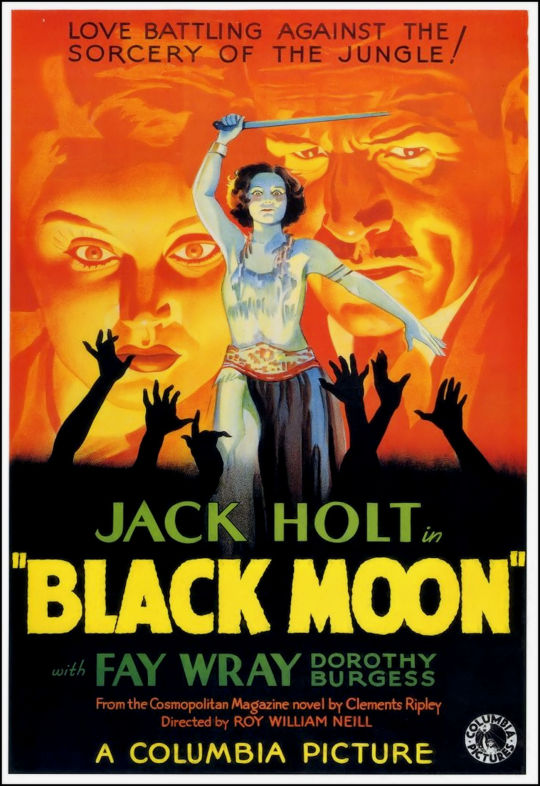
Source Material: "Black Moon" by Clements Ripley
Year: 1934
Genre: Occult
Rating: UR (Recommended: PG-13)
Country: USA
Languages: English, Kreyòl
Runtime: 1 hour 8 minutes

Director: Roy William Neill
Cinematographer: Joseph August
Editor: Richard Cahoon
Writer: Wells Root
Cast: Jack Holt, Fay Wray, Dorothy Burgess
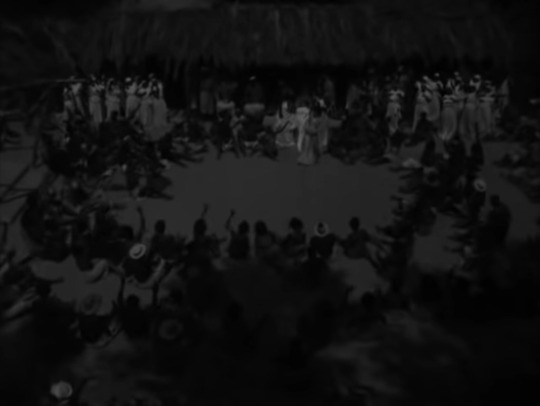
Plot: A white woman returns to the island where her parents were murdered in a Voodoo ritual.
Review: A technically bland and staggeringly racist propaganda piece that says Voodoo is evil, black indigenous people are savages, and white women are delicate flowers in danger of defilement if they dare to treat black people as human beings.
Overall Rating: 0/5
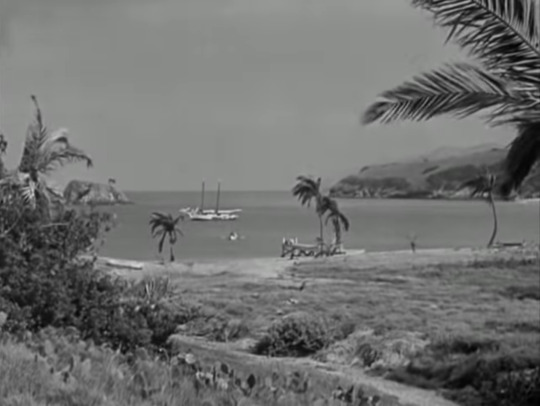
Story: 0/5 - Abysmal. Beyond being racist and pro-colonialist, it's horribly paced and predictable.
Performances: 2/5 - Some are totally generic and unmemorable, and some are outright offensive caricatures.
Cinematography: 1.5/5 - Artistically weak and often poorly lit.
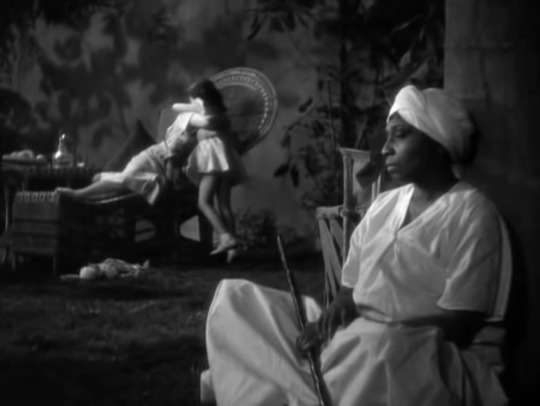
Editing: 2/5 - Tends to be abrupt and muddled.
Music: 2/5 - Like everything else that isn't horrible, it's generic.
Effects: 2/5
Sets: 2.5/5 - The plantation looks solid but the jungle sets vary in quality and the volcano looks outright bad.
Costumes, Hair, & Make-Up: 3/5
youtube
Trigger Warnings:
The entire film is anti-black, anti-indigenous, pro-colonialist propaganda that's only worth discussing to acknowledge the racist history of the film industry and horror genre
Offensive portrayal of the Voodoo religion
Child harm
Brief but moderate violence
Mention of cannibalism
#Black Moon (1934)#Black Moon#Roy William Neill#American#occult#Dread by the Decade#review#1930s#antiblackness#racism#anti-black racism#anti-indigenous racism#colonialism
6 notes
·
View notes
Text

[Embedded tweet described in alt text of above image. Image embedded within the tweet is a section of a book page that reads as follows. Bold text is highlighted in the original image.]
Mollie's family was straddling not only two centuries but two civilizations. Her family's distress increased in the late 1890s as the U.S. government intensified its push for the culmination of the assimilation campaign: allotment. Under the policy, the Osage reservation would be divvied up into 160-acre parcels, into real estate, with each tribal member receiving one allotment, while the rest of the territory would be opened to settlers. The allotment system, which had already been imposed on many tribes, was designed to end the old communal way of life and turn American Indian tribes into private-property owners - a situation that would, not incidentally, make it easier to procure their land.
[End book excerpt.]
More about this here (link). The law (or one of the laws) putting this practice of allotment into motion was called the Dawes Act.
#dawes act#assimilation#anti-indigenous racism#anti indigenous racism#racism#genocide#cultural destruction#cultural erasure#imperialism#colonialism#manifest destiny#alienation#private property is theft#private property#capitalism
16 notes
·
View notes
Text
also complete subject change but like. that person that was in my notes that said "i'd love to support [landback] but like what are non-white people imagining is gonna happen?" Well Definitely Not Whatever The Fuck You Are Imagining That's For Damn Sure! It's almost like that was the whole point of the post or something!!!
4 notes
·
View notes
Text
had a moment of profound frustration looking at bougie winter gear, because i want a fleece that is plastic-free if possible & am in a position to get relatively expensive winter clothes as long as i am confident that i will keep & use them for a long time. anyway came across one which is cream trimmed with elaborate woven bands, described as "nordic," and got mad—those decorative woven bands aren't vaguely nordic, they're specifically saami; sapmi weavers have had to struggle to preserve these traditions in the face of ongoing repression by nordic governments. just absolutely infuriating but not particularly surprising that a vegan, earth-friendly clothing company is so comfortable using indigenous aesthetics without indigenous connections
#not getting into cultural appropriation writ large but this is surely tasteless on a basic level#like calling something 'tribal' when it is in fact lifted or distorted from recognizable indigenous artistic practices#as though sapmi weavers need no acknowledgment & are not practicing a distinct recognizable & noteworthy art#anti-indigenous racism#fiber crafts#maybe i will get the stoorstalka bandweaving kit it looks fun
2 notes
·
View notes
Text
After a delay called unacceptable by the province's racism commissioner, the New Brunswick government has announced its first steps to rid the provincial map of places named with a slur against Indigenous women.
Tourism, Heritage and Culture Minister Tammy Scott-Wallace said in a statement this week that the government is launching a 28-day consultation seeking proposals to rename a mountain in northern New Brunswick. The mountain, along with a nearby community and a protected natural area, is named with a derogatory term for an Indigenous woman.
"There has been a lot of discussion with respect to the derogatory names in the province and why it has taken so long to have new names considered," Scott-Wallace said. Provincial officials said Tuesday the initiative deals with two of the eight locations named with the slur that are under provincial jurisdiction, "and separate processes will follow for the remaining six."
Full article
Tagging: @politicsofcanada
#cdnpoli#canadian politics#canadian news#canada#canadian#new brunswick#racism#colonialism#racial slurs#anti-Indigenous racism#racism tw#colonialism tw#racial slurs tw#anti-Indigenous racism tw
41 notes
·
View notes
Text

White people on this app will for real just say fucking anything huh. Beyond parody.
5 notes
·
View notes